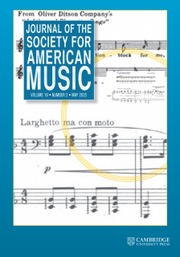No CrossRef data available.
Article contents
“I'm on My Way to a Heav'nly Lan’”: Porgy and Bess as American Religious Export to the USSR
Published online by Cambridge University Press: 04 May 2021
Abstract
Scholars have explored the use of Breen-Davis's Porgy and Bess and its stellar ensemble cast to counter Soviet criticism of US race relations during the Cold War—but an equally prominent theme in contemporary coverage of the production is spirituality. Onstage as well as off, the Soviet tour of Porgy and Bess reflected both American and Soviet ideas about religion's role in international diplomacy in the mid-1950s. This article explores religiosity in the Breen-Davis production as well as the reception of the 1955–56 Soviet tour both in the United States, where the production represented a hopeful vision of the nation's racial tolerance and religious pluralism, and in the USSR, where the tour's twin messages of American spiritual superiority and racial equality were challenged by Soviet authorities. Drawing on materials from the Robert Breen Archives housed in the Jerome Lawrence and Robert Lee Theatre Research Institute at Ohio State University, this article considers Breen-Davis's Porgy and Bess as a religious export to the USSR, enriching our understanding of US cultural diplomacy and Cold War–era musical exchange with broader implications for American–Soviet history, religious studies, and opera analysis.
- Type
- Research Article
- Information
- Copyright
- Copyright © The Author(s), 2021. Published by Cambridge University Press on behalf of the Society for American Music
Footnotes
I am grateful to Christi-Anne Castro, Mark Clague, Gabriela Cruz, Austin Stewart, Kai Carson West, and the anonymous readers at the Journal of the Society for American Music for their invaluable feedback and suggestions at various stages during this article's preparation.


